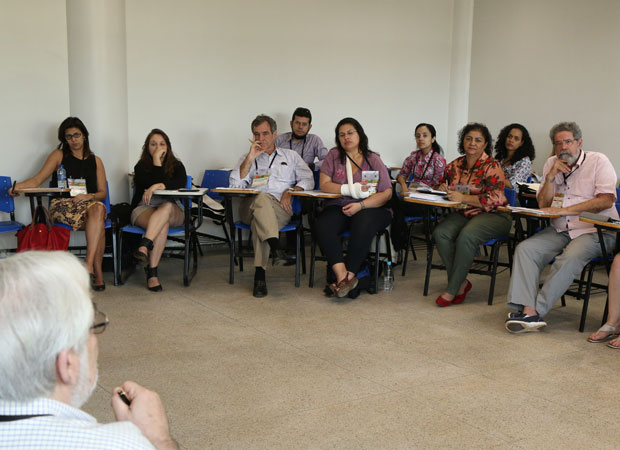Abrascão 2015 gathers over 40 workshops on the last day of pre-congress
Notícia publicada em:
- 29 de Julho de 2015
The second day of the pre-congress Abrascão 2015 ended with more than 40 workshops, courses, lectures, meetings, round tables and symposia conducted of diverse themes and areas of health, organized and promoted by the Thematic Groups, Committees and Fora of Abrasco. In all of them, the right to information, the construction of critical thinking, the exchange of knowledge and the strengthening of the Unified Health System – SUS were the protagonists.
As most activities were self-funded by the proponents and had the massive participation of Conference participants, the proposal for a collective construction of Congress was considered effective. “Abrasco once again is to be congratulated by Abrascão 2015. There are several different research arrays, democratizing the congress, which favors good discussions. The audience is debating and this fills us up with pride”, said Wildo Navegantes de Araújo, Coordinator of the Secondary Data Analysis course, proposed by the Commission of Epidemiology of Abrasco.
“Our idea of course is to promote interaction and integration between health workers and researchers who work with access to the information system, in order to enable them for the use of the system and encourage its improvement”, added Wildo, who is also a professor at the University of Brasilia (UnB) and member of the Scientific Committee of the Congress.
With an interdisciplinary approach of the fields of public health, of international relations and of bioethics, the workshop of International Cooperation in Health: the Strategy of Ring of Fire, proposed by the Center for Bioethics and Diplomacy Studies in Health of the Oswaldo Cruz Foundation (Nethis/Fiocruz) pointed out the importance of discussing the concept of health for the individual, society and the environment.
“The relationship of international cooperation has a nice speech, but in practice benefits only countries with the highest development rates. The socio-environmental relationship is put aside and the idea of becoming this a matter of public interest is very restricted, we must promote the reformulation of the international cooperation that stresses the social inequality” explained José Paranaguá, Coordinator of Nethis/Fiocruz
The theme of the communication, internet and health were also present in the workshops. Professor and researcher of the Post-graduate program on information and communication on health of the Oswaldo Cruz Foundation, André Pereira Neto, coordinated the course Internet and health and presented the need of the academic community of public health to put the theme of internet time on the agenda.
“I’m associated and went to almost all the congresses of Abrasco, and in recent years I’ve been pointing out the influence of the internet on people’s health and insist that this theme enters in the agenda of the academic world of public health, as internet is the subject of 21st century! This course taught is an important step to consolidate the theme on the timeline of Abrasco”, stressed the professor.
By Rafael Avelino from Abrasco.





